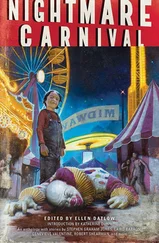Arty stopped coming to the family van for meals. Mama cooked his food and I carried it to him on trays.
The midway jingled with profits from Arty’s crowd. The twins, the geeks, the swallowers, and every act in the variety tent bubbled daily with cheerful audiences, but they were really just waiting for Arty.
Arty was absorbed. Mama treated it as another one of his growth phases. “He’s always been moody, sensitive,” she said.
Papa strode the line from early to late—“working harder than I ever have!”—jubilant at the gross and his own roaring of orders and arrangements. But he was fuzzy behind the eyes because he was no longer the actual King Cob of all the Corn. In his dire heart he felt the difference. He wasn’t working for himself anymore. He was working for Arty. Everything revolved around Arty, from our routes and sites to the syrup flavors in the soda fountains.
We were all nervy with an unspoken anticipation. We were accelerating toward something and we didn’t know what.
12. NOTES FOR NOW: Miss Lick’s Home Flicks
The library microfilm spews a stream of nuggets. An announcement of the birth of Mary Malley Lick, eight pounds, nine ounces, at Good Samaritan Hospital. The obituary of Eleanor Malley Lick, dead of cancer when her daughter was eight years old. Mary Lick, an uncomfortable fifteen-year-old in a baggy sweater, pictured as “A sophomore at Catlin Gabel School, who holds the Oregon State Women’s Handgun Marksmanship championship for the second year in a row.” Thomas R. Lick cutting the ribbon for the new trophy and smoking room at the Sauvie Island Gun Club.
Then there are articles about all the Lick enterprises. There are fifty-one plants nationwide and a flagship factory tucked into a bend in the Willamette just north of the Fremont Bridge. The product is Lickety Split dinners — portable food for airlines and for institutions, from rest homes to schools, jails to asylums. Nineteen full menus with special Kiddie, Diabetic, Kosher, and NMR (No Mastication Required) lines. Everything from three to six courses in plastic trays with an indentation for each item. A subsidiary arm leases microwave ovens to clients for “on-the-spot warming.”
An item about the failure of a labor strike at the Portland plant mentions that Lick Enterprises employed close to eight thousand workers coast to coast and not one of them belonged to a union. Thomas R. fired all the strikers in Portland and hired fresh help unpolluted by notions of collective bargaining.
A mug shot pictures prim young Mary, with her spanking new degree in Business from the state university, recently named Portland plant manager at the age of twenty-four. The caption explains that despite her age she was “by no means a novice, having worked in the plant for seven years in various departments ranging from bookkeeping to sanitation.”
In the old man’s obituary — cancer — seven years later, Mary is listed as Executive Vice President and sole heir to Lick Enterprises.
The last item is a tentative mention in the also-ran list trailing the four hundred richest individuals in the nation. The dry line beside her name explains that, since all Lick assets are privately held, only estimates of her net worth are available.
I take the copies back to my room and read everything again. There is no mention of relatives, friends, or lovers, no names or faces recur near Mary Lick. Every photo shows her isolated even in a group. Her expression is never quite in sync with the cheer or solemnity of those around her. She is alone.
Just before midnight I go downstairs and listen to Lil breathing. Then I go upstairs and knock on Miranda’s door. There is no answer.
After the morning shift at KBNK I hole up in an empty office at the station and spend the afternoon on the phone. I enjoy it. I can never be inconspicuous in person. A hunchback is not agile enough for efficient skulking. But my voice can take me anywhere. I can be a manicured silk receptionist, a bureaucrat of impenetrable authority, or an old college chum named Beth. I can be a pollster doing a survey of management techniques or a reporter for the daily paper doing a feature on how employees view their bosses. Anonymous, of course — no real names used and all businesses disguised.
A dozen phone calls into the day I am thinking grimly about my luck. Mary Lick could have played chess or poker or pool. She might have been intrigued by dim, cozy porno shops with black booths for a spy to hide in. It would have been a snap to get close to her if she were a horticulture type or a dog breeder. But no. Miss Lick is physical. Her secretary exclaims, “She just couldn’t get from one day to the next without her two-mile swim in the evening.”
In my family Arty swam and nobody else did. I never learned. Trudging home it occurs to me that things could be worse. Lick could just as easily have gone in for jet boat races, jumping horses, or sky diving. I can learn to swim.
Miranda’s windows are glowing yellow as I come up the street. I go straight upstairs to her door and knock. She laughs and takes me in and shoos out a handsome man named Kevin so she can draw me. I sit naked for hours watching her. She draws and makes tea and draws and talks. We don’t mention her tail.
• • •
The Athletic Club is only a few blocks from the apartment building where Miss Lick owns and occupies the top floor. The club is in the same style as the apartment building, a massive brick-and-glass temple to the joys of insulation. The word is that Miss Lick’s father was instrumental in having the club opened to female membership.
“Of course we have been integrated for more than thirty years,” the information girl told me over the phone. I asked to have the club brochures mailed to me. The pamphlets were glossy productions with color photos of the Oak Trophy Lounge (full-service bar), the saunas, dining room, weight rooms, handball and tennis courts, and the Thomas R. Lick memorial swimming pool. I invested in the six-week introductory membership and spent four afternoons loitering in the five-story parking lot across the street to watch Miss Lick’s black sedan enter the brick gateway at 5:30 every evening.
I stand in the middle of the deserted locker room, a ditty bag in one hand and a combination lock in the other, staring at myself in the mirror that covers the door. I look old. I have always looked old. The hump is not a youthful thing and the nakedness of my scalp and my hairless eyelids and brow ridges creak of something ancient. I have stuffed my wig into the ditty bag already, waiting for her. “Always remember,” my father used to say, “how much leverage you’ve got on the norms just in your physical presence.” I examine my wide mouth and pink eyes, and the slope of cheekbones into the tiny leg that serves me for a jaw and wonder if it will work this time when I need it to. After all, Miss Lick is not a norm and for all I know she is immune to the usual tricks.
She comes through the door and it starts — her double-take stare reassures me instantly. She is not immune. There is the standard civilized greeting, ignoring the obvious.
“Perhaps you can tell me which lockers are …”
I hesitate and she drops her purse on a bench and nods at a row of cabinets against the wall, “All those without locks.”
I shuffle, apologetic, catching a sidelong glimpse of my awkward figure moving toward the lockers, my heart bulging wild in my mouth with fear that I’ve overplayed it.
Her seriousness surprises me — the slow weight of her — the lack of cruelty imprinted on her big wary face. Bubbling won’t work on her. I set myself to go straight-faced and slow-voiced — to gauge words carefully and understate everything.
Читать дальше












